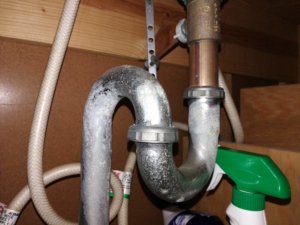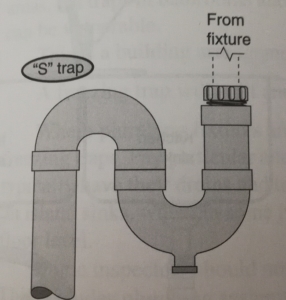
Improper “S” Trap at Kitchen Sink
During a home inspection it is common to find sink drains with an improperly installed trap. Noxious sewage gasses may come up from the pipes if there is an improper trap on a sink drain. The flow of sewage gasses are normally blocked by the water sitting in the trap.
When a trap is correctly installed on a drain, it resembles the shape of a ‘P’. These are called ‘P’ traps. Sometimes for various reasons, plumbers will install traps with questionable performance. The most common culprit is the famous ‘S’ trap. These are often found when a home is on piers. Even though ‘S’ traps are very common, they are still considered to be a deficiency.
The problem is the design of the ‘S’ traps. When water is flowing down the drain and into a ‘S’ trap, the flow can siphon water out of the trap. With little to no water in the waste trap, sewage gasses are able to creep back up to the home. ‘P’ traps do not have this problem.

“S” Trap Diagram
Turning your improper ‘S’ traps into proper ‘P’ traps can be a costly repair and sometimes it is just not feasible. In many cases ‘S’ traps do not cause any major problems for the home occupants. Flushing a large amount of water down the drain at once is more likely cause it to siphon out the trap. If you run a little more water down the sink drain, the trap should stay full and block the gasses like normal.
